Module 11 Unit 1 In China, we open a gift later课件 2022-2023学年外研版八年级英语上册(共32张PPT)
文档属性
| 名称 | Module 11 Unit 1 In China, we open a gift later课件 2022-2023学年外研版八年级英语上册(共32张PPT) | 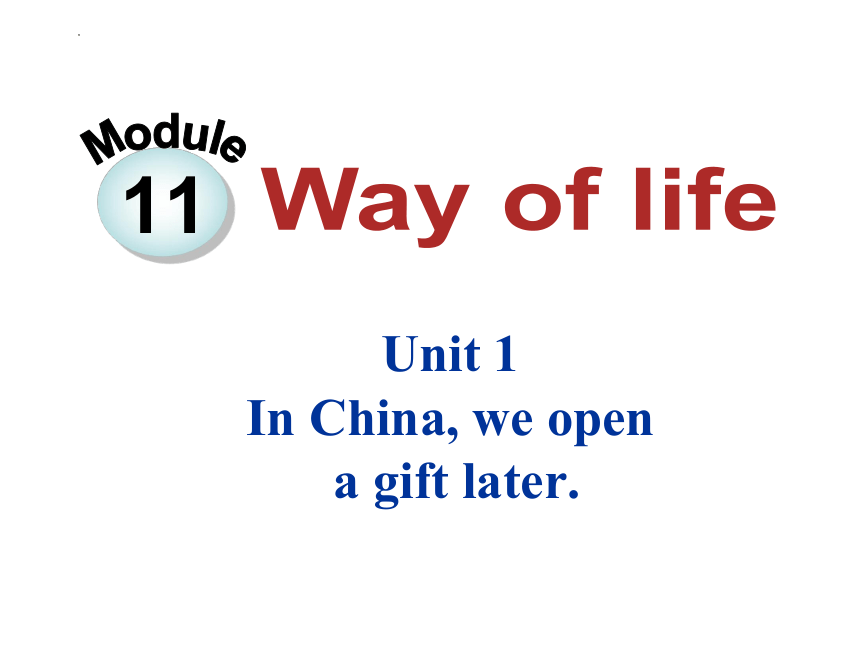 | |
| 格式 | zip | ||
| 文件大小 | 1.5MB | ||
| 资源类型 | 教案 | ||
| 版本资源 | 外研版 | ||
| 科目 | 英语 | ||
| 更新时间 | 2022-10-04 10:44:16 | ||
图片预览


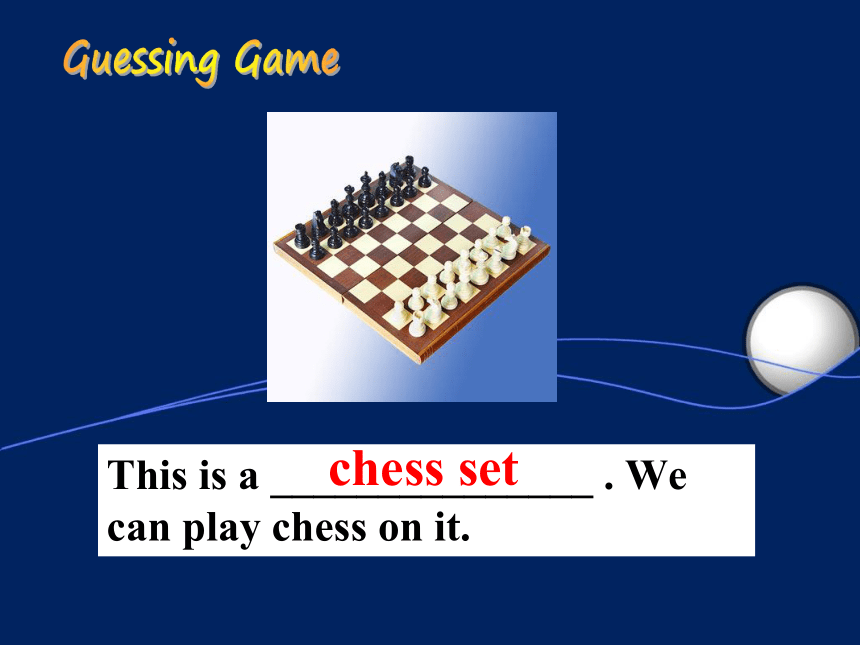

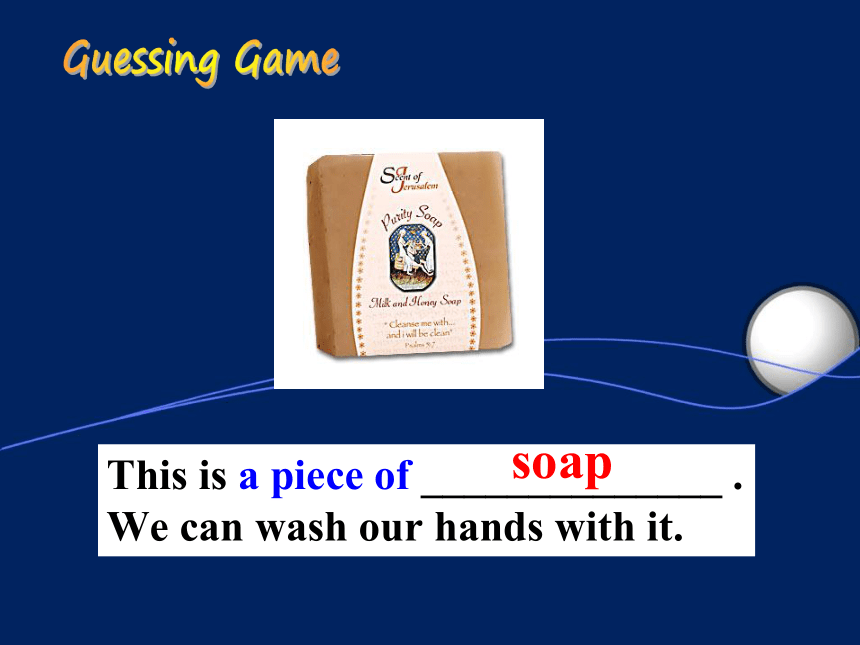

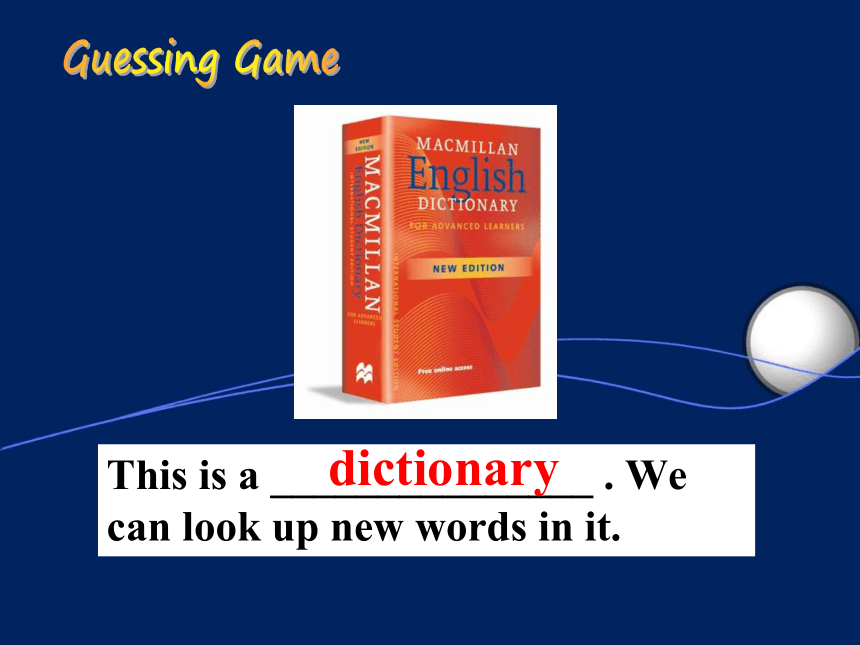

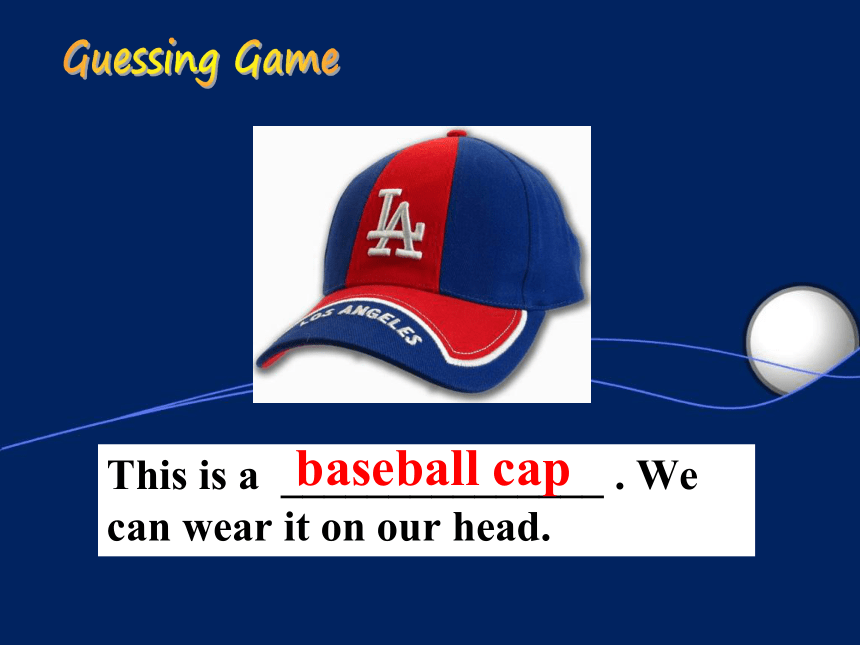

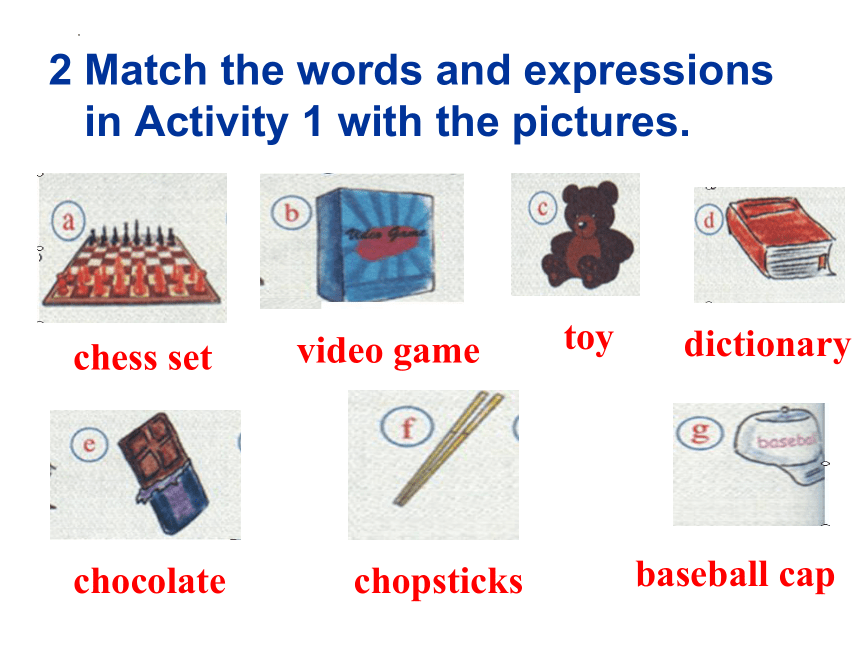

文档简介
(共32张PPT)
11
Way of life
Module
Unit 1
In China, we open
a gift later.
Guessing Game
This is a _______________ . We can put money in it.
purse/wallet
Guessing Game
This is a _______________ . We can play chess on it.
chess set
Guessing Game
This is a bar of _______________ . We can eat it and it tastes sweet.
chocolate
Guessing Game
This is a piece of ______________ . We can wash our hands with it.
soap
Guessing Game
This is a _______________ . We can watch it.
DVD
Guessing Game
This is a _______________ . We can look up new words in it.
dictionary
Guessing Game
This is a pair of _______________ . We Chinese can eat with them.
chopsticks
Guessing Game
This is a _______________ . We can wear it on our head.
baseball cap
1 Listen and number the words and
expressions as you hear them.
baseball cap chess set
chocolate chopsticks
dictionary toy
video game
6
2
3
7
5
4
1
2 Match the words and expressions
in Activity 1 with the pictures.
chess set
toy
baseball cap
video game
dictionary
chocolate
chopsticks
Question:
What present do they buy for Lingling
An English dictionary.
Then listen and read
Betty: Happy birthday, Lingling.
Daming: Here’s your gift.
Lingling: Oh, you remembered! What a surprise!
Tony: You can open it!
Lingling: I don’t think I should open it now. In
China, we open a gift later.
Betty: But back in the US, we open a gift immediately.
Lingling: So what do I do
Betty: You needn’t wait!
(Lingling opens her presents and finds a dictionary.)
Lingling: Oh, thank you. I really wanted one.
Betty: We’re happy you like it.
Tony: I noticed another difference. In China, you
accept a gift with both hands. But in the west,
we usually don’t pay much attention to that.
Betty: That’s interesting! I’m interested to know all
the Chinese traditions. Tell me more.
Lingling: There are a lot. For example, in my home
town, people say you mustn’t do any
cleaning on the first day of the Spring
Festival. And you mustn’t break anything.
It’s bad luck.
Daming: You must only use red paper for hongbao
because red means luck. And you’d better
not have your hair cut during the Spring
Festival month.
Tony: You can’t be serious!
Daming: And in the north of China, people eat lots
of Jiaozi!
Betty: Perfect! They taste great.
Tony: I like eating jiaozi too. Anyway, the Spring
Festival is still over a month away. Let’s
celebrate Lingling’s birthday first!
Now check (√) what you usually do in
China.
1 Open a present immediately when you receive it.
2 Accept a present with both hands.
3 Use red paper for hongbao.
4 Do cleaning on the first day of the Spring Festival.
5 Cut your hair during the Spring Festival.
6 Break something during the Spring Festival.
√
√
4 Complete the passage with the
words in the box.
It is always a(n)(1) to receive gifts from
family members and friends. In China, we usually
(2) a gift with both hands and open it later.
But in the west, people usually do not pay much
(3) to that. During the Spring Festival, there
are many (4) . For example, people in the
north of China eat lots of jiaozi. They (5) great.
accept attention surprise taste traditions
traditions
surprise
accept
attention
taste
You _____ ______ the table.
×
√
You _______ _____ the bowls
when you are jumping.
clean
wash
must
mustn’t
用 must, mustn’t和can’t 完成句子。
You _____ ____ your clothes on Sunday.
wash
You _______ ____ the guitar every evening.
play
×
√
must
mustn’t
You _______ _____ the garden so dirty.
make
You _____ ____ your mother keep the garden beautiful.
help
×
√
must
mustn’t
You _____ _____ the floor with a towel (毛巾).
You ____ _____ the floor with _____ (拖把).
√
clean
clean
a mop
must
can’t
1. You _______ open a present when
you receive it.
2. You _____ use both hands when
you accept a present.
3. You _____wrap hongbao in red paper.
4. You _______ wrap hongbao in white,
blue or black.
Talk with must/mustn’t or can’t.
mustn’t
must
must
mustn’t
5. You _______ do cleaning on the first
day of the Chinese New Year.
6. You _______ cut your hair at Spring
Festival.
7. You _______ break anything at
Spring Festival.
8. You _____ eat lots of dumplings at
Spring Festival.
mustn’t
mustn’t
mustn’t
must
Grammar
情态动词must的用法
⑴must表示主观义务,意思是“必须”
由must引起的疑问句,肯定回答要用must, 否定回答要用needn’t “不必”。
I must finish the work before nine.
Must I finish the work before nine Yes, you must.
No, you needn’t.
情态动词must的用法
⑵mustn’t表示禁止,意思是“不可以,不要”
由may引起的疑问句,肯定回答要用may, 否定回答要用mustn’t 。
You mustn’t come late tomorrow.
May I hand in the paper next time
Yes, you may.
No, you mustn’t.
Grammar
情态动词must的用法
⑶must表示肯定的猜测,意思是“一定”
You must be a doctor!
He must have read the book several times.
Grammar
2.情态动词can的用法
⑴can表示允许,意思是“可以”
You can go and see the lion dance.
You can’t play football in the street.
⑵can表示能力,意思是“会,能够”
He can drive a car.
⑶can表示猜测,意思是“可能”
She can be at home at the moment.
Grammar
注意:
⑴在表示客观需要时一般用have to“不得不”,而不用must。
It’s raining heavily so we have to stay at home and do some reading.
⑵在表示能力时,can可以和be able to互换,后者有人称变化和更多的时态变化。
He was able to mend the machine.
Grammar
课堂小练习
选择填空:
1. “Must I finish all the work before I leave ” “No, you ___ .”
A. don’t B. can’t C. mustn't D. needn't
2. “May I come back after 11 p.m. ” “No, you ___ .”
A. don’t B. won’t C. mustn’t D. may not
3. You ___ be quiet when you are in a library.
A. may B. can C. will D. must
4. She ___ go to L. A. for Christmas. She hasn’t decided yet.
A. may B. will C. should D. must
√
√
√
√
完成句子:
1. 进办公室前敲敲门是礼貌行为。
It is good manners ____________________
the door before you go into the office.
2. 用双手去抓球, 那样才不会掉。
______________________ catch the ball
so that you can’t drop it .
3. 在中国,你一定不要在大年初一做扫除。
In China , you ________________ cleaning
_______________ the Chinese New Year .
4. 在英国, 你必须靠左侧通行。
You ____________________ when you travel in Britain.
to knock at
Use both hands to
mustn’t do any
on the first day of
must walk on the left
Let’s make rules (规则) for a zoo.
must / mustn’t / can’t
feed the animals
take away the litter(垃圾)
be quiet
clap(拍) on their cages
School rules
You must come to school on time(准时).
You must put up your hands when you answer a question.
You must wear school uniforms(校服).
Can you add more school rules
must / mustn’t / can’t
11
Way of life
Module
Unit 1
In China, we open
a gift later.
Guessing Game
This is a _______________ . We can put money in it.
purse/wallet
Guessing Game
This is a _______________ . We can play chess on it.
chess set
Guessing Game
This is a bar of _______________ . We can eat it and it tastes sweet.
chocolate
Guessing Game
This is a piece of ______________ . We can wash our hands with it.
soap
Guessing Game
This is a _______________ . We can watch it.
DVD
Guessing Game
This is a _______________ . We can look up new words in it.
dictionary
Guessing Game
This is a pair of _______________ . We Chinese can eat with them.
chopsticks
Guessing Game
This is a _______________ . We can wear it on our head.
baseball cap
1 Listen and number the words and
expressions as you hear them.
baseball cap chess set
chocolate chopsticks
dictionary toy
video game
6
2
3
7
5
4
1
2 Match the words and expressions
in Activity 1 with the pictures.
chess set
toy
baseball cap
video game
dictionary
chocolate
chopsticks
Question:
What present do they buy for Lingling
An English dictionary.
Then listen and read
Betty: Happy birthday, Lingling.
Daming: Here’s your gift.
Lingling: Oh, you remembered! What a surprise!
Tony: You can open it!
Lingling: I don’t think I should open it now. In
China, we open a gift later.
Betty: But back in the US, we open a gift immediately.
Lingling: So what do I do
Betty: You needn’t wait!
(Lingling opens her presents and finds a dictionary.)
Lingling: Oh, thank you. I really wanted one.
Betty: We’re happy you like it.
Tony: I noticed another difference. In China, you
accept a gift with both hands. But in the west,
we usually don’t pay much attention to that.
Betty: That’s interesting! I’m interested to know all
the Chinese traditions. Tell me more.
Lingling: There are a lot. For example, in my home
town, people say you mustn’t do any
cleaning on the first day of the Spring
Festival. And you mustn’t break anything.
It’s bad luck.
Daming: You must only use red paper for hongbao
because red means luck. And you’d better
not have your hair cut during the Spring
Festival month.
Tony: You can’t be serious!
Daming: And in the north of China, people eat lots
of Jiaozi!
Betty: Perfect! They taste great.
Tony: I like eating jiaozi too. Anyway, the Spring
Festival is still over a month away. Let’s
celebrate Lingling’s birthday first!
Now check (√) what you usually do in
China.
1 Open a present immediately when you receive it.
2 Accept a present with both hands.
3 Use red paper for hongbao.
4 Do cleaning on the first day of the Spring Festival.
5 Cut your hair during the Spring Festival.
6 Break something during the Spring Festival.
√
√
4 Complete the passage with the
words in the box.
It is always a(n)(1) to receive gifts from
family members and friends. In China, we usually
(2) a gift with both hands and open it later.
But in the west, people usually do not pay much
(3) to that. During the Spring Festival, there
are many (4) . For example, people in the
north of China eat lots of jiaozi. They (5) great.
accept attention surprise taste traditions
traditions
surprise
accept
attention
taste
You _____ ______ the table.
×
√
You _______ _____ the bowls
when you are jumping.
clean
wash
must
mustn’t
用 must, mustn’t和can’t 完成句子。
You _____ ____ your clothes on Sunday.
wash
You _______ ____ the guitar every evening.
play
×
√
must
mustn’t
You _______ _____ the garden so dirty.
make
You _____ ____ your mother keep the garden beautiful.
help
×
√
must
mustn’t
You _____ _____ the floor with a towel (毛巾).
You ____ _____ the floor with _____ (拖把).
√
clean
clean
a mop
must
can’t
1. You _______ open a present when
you receive it.
2. You _____ use both hands when
you accept a present.
3. You _____wrap hongbao in red paper.
4. You _______ wrap hongbao in white,
blue or black.
Talk with must/mustn’t or can’t.
mustn’t
must
must
mustn’t
5. You _______ do cleaning on the first
day of the Chinese New Year.
6. You _______ cut your hair at Spring
Festival.
7. You _______ break anything at
Spring Festival.
8. You _____ eat lots of dumplings at
Spring Festival.
mustn’t
mustn’t
mustn’t
must
Grammar
情态动词must的用法
⑴must表示主观义务,意思是“必须”
由must引起的疑问句,肯定回答要用must, 否定回答要用needn’t “不必”。
I must finish the work before nine.
Must I finish the work before nine Yes, you must.
No, you needn’t.
情态动词must的用法
⑵mustn’t表示禁止,意思是“不可以,不要”
由may引起的疑问句,肯定回答要用may, 否定回答要用mustn’t 。
You mustn’t come late tomorrow.
May I hand in the paper next time
Yes, you may.
No, you mustn’t.
Grammar
情态动词must的用法
⑶must表示肯定的猜测,意思是“一定”
You must be a doctor!
He must have read the book several times.
Grammar
2.情态动词can的用法
⑴can表示允许,意思是“可以”
You can go and see the lion dance.
You can’t play football in the street.
⑵can表示能力,意思是“会,能够”
He can drive a car.
⑶can表示猜测,意思是“可能”
She can be at home at the moment.
Grammar
注意:
⑴在表示客观需要时一般用have to“不得不”,而不用must。
It’s raining heavily so we have to stay at home and do some reading.
⑵在表示能力时,can可以和be able to互换,后者有人称变化和更多的时态变化。
He was able to mend the machine.
Grammar
课堂小练习
选择填空:
1. “Must I finish all the work before I leave ” “No, you ___ .”
A. don’t B. can’t C. mustn't D. needn't
2. “May I come back after 11 p.m. ” “No, you ___ .”
A. don’t B. won’t C. mustn’t D. may not
3. You ___ be quiet when you are in a library.
A. may B. can C. will D. must
4. She ___ go to L. A. for Christmas. She hasn’t decided yet.
A. may B. will C. should D. must
√
√
√
√
完成句子:
1. 进办公室前敲敲门是礼貌行为。
It is good manners ____________________
the door before you go into the office.
2. 用双手去抓球, 那样才不会掉。
______________________ catch the ball
so that you can’t drop it .
3. 在中国,你一定不要在大年初一做扫除。
In China , you ________________ cleaning
_______________ the Chinese New Year .
4. 在英国, 你必须靠左侧通行。
You ____________________ when you travel in Britain.
to knock at
Use both hands to
mustn’t do any
on the first day of
must walk on the left
Let’s make rules (规则) for a zoo.
must / mustn’t / can’t
feed the animals
take away the litter(垃圾)
be quiet
clap(拍) on their cages
School rules
You must come to school on time(准时).
You must put up your hands when you answer a question.
You must wear school uniforms(校服).
Can you add more school rules
must / mustn’t / can’t
同课章节目录
- Module 1 How to learn English
- Unit 1 Let's try to speak English as much as possi
- Unit 2 You should smile at her.
- Unit 3 Language in use .
- Module 2 My home town and my country
- Unit 1 It's taller than many other buildings.
- Unit 2 Cambridge is a beautiful city in the east o
- Unit 3 Language in use .
- Module 3 Sports.
- Unit 1 Nothing is more exciting than playing tenni
- Unit 2 This year we training more carefully.
- Unit 3 Language in use .
- Module 4 Planes, ships and trains .
- Unit 1 He lives the farthest from school.
- Unit 2 What is the best way to travel.
- Unit 3 Language in use .
- Module 5 Lao She Teahouse.
- Unit 1 I wanted to see the Beijing Opera.
- Unit 2 It descibes the changes in Chinese society.
- Unit 3 Language in use .
- Module 6 Animals in danger.
- Unit 1 It allows people to get closer to them .
- Unit 2 The WWF is working hard to save them all.
- Unit 3 Language in use .
- Revision module A
- Module 7 A famous story
- Unit 1 Alice was sitting with her sister by the ri
- Unit 2 She was thinking about her cat.
- Unit 3 Language in use .
- Module 8 Accidents
- Unit 1 While the car were changing to red, a car s
- Unit 2 I was trying to pick it up when it bite me
- Unit 3 Language in use .
- Module 9 Population
- Unit 1 The population of China is about 1.37 billi
- Unit 2 Arnwick was a city with 200,000 people.
- Unit 3 Language in use .
- Module 10 The weathe
- Unit 1 It might snow.
- Unit 2 The weather is fine all year round.
- Unit 3 Language in use .
- Module 11 Way of life
- Unit 1 In China ,we open a gift later.
- Unit 2 In England, you usually drink tea with milk
- Unit 3 Language in use .
- Module 12 Help
- Unit 1 What should we do before help arrives?
- Unit 2 Stay away from windows and heavy furniture.
- Unit 3 Language in use .
- Revision module B
